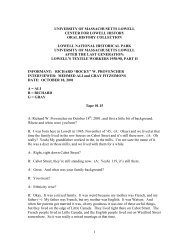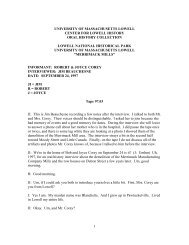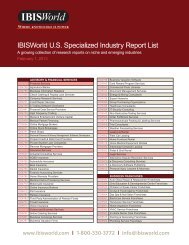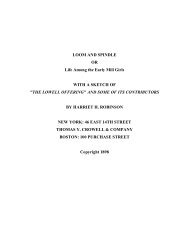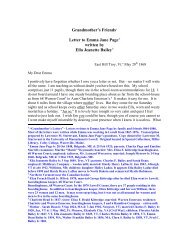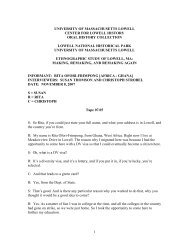Coffey, Dennis 03.09 - University of Massachusetts Lowell Libraries
Coffey, Dennis 03.09 - University of Massachusetts Lowell Libraries
Coffey, Dennis 03.09 - University of Massachusetts Lowell Libraries
Create successful ePaper yourself
Turn your PDF publications into a flip-book with our unique Google optimized e-Paper software.
meeting with them and saying, “How are you going to work this out?” So you know,<br />
Bobby played, played it well.<br />
A: Yah, yah. He was close to the gas company, wasn’t he?<br />
D: Oh yah, yah he worked for the gas company. Yah, so that would, you know, that was<br />
one angle that he had for the Putmans I guess, that would have been.<br />
A: Right, right.<br />
D: But yah, he knew how to play the angles, absolutely. And you know, like I said you<br />
know, until you reminded me <strong>of</strong> Bobby’s role, at the staff level we talked about eminent<br />
domain, we talked about the pros and cons and we said, “This isn’t going to work,” you<br />
know, we need to get them to be willing partners in this, rather than kick them out. And<br />
then what do we want the responsibilities for the system for, you know, how are we going<br />
to run this system? Because we still would be obliged to provide the power and all that<br />
kind <strong>of</strong> stuff. (A: Yah) You know, and we really saw it as a liability for either the city<br />
or the state to have a title to this, to this asset. And but Bobby, you know, smarter than<br />
we were politically, you know, took that campaign into the, to the public you know. And<br />
yah, I mean they were painted with a bad brush and given the bad image and so forth, but<br />
ultimately you know, when you look at their responsibilities and so forth, and the<br />
economic condition <strong>of</strong> the city at the time too. I mean they still had to maintain the<br />
system. It’s not unlike the railroad you know, they had to maintain the system. But their,<br />
their economic base was gone. (A: Really) You know, so you know, it still cost the<br />
same to run that five miles <strong>of</strong> canals whether you have ten customers, or a hundred<br />
customers. If you have ten customers and half <strong>of</strong> them can’t pay their rent, you know,<br />
you’re really screwed. You know, and so where do you, where do you cut cost? Well<br />
you know, don’t cut that check to the city. (A: Yah!) [Laughs] And you know, but that<br />
was not unusual at the time. Vinnie Pitlinsky, when he and I first got together, was the<br />
tax title program under Center Cities. You know, and it was going after um, you know,<br />
landowners <strong>of</strong> you know, back taxes and so forth. And Vinnie and what was his name?<br />
A: Robert Pelky?<br />
D: Yah before Bob. Before Bob Pelky was another guy. Anyway we had this little tax<br />
program And you know, <strong>of</strong> course Bobby was Chairman <strong>of</strong> the Center Cities Committee<br />
you know, and you know, so that was I think what may have been what peeked his<br />
interest by going after the Locks and Canals. But at the same time he was doing this he<br />
was also working his other angles. And like I said, ultimately they came on board and<br />
they wanted to participate. They saw the value in working together, as opposed to having<br />
a negative relationship.<br />
A: I just want to get back quickly to Tom Markham. You said you worked with him.<br />
Tell, just say you know, tell me about Tom Markham first.<br />
D: Yah, yah, yah. Well Tom was certainly a great storyteller.<br />
28



